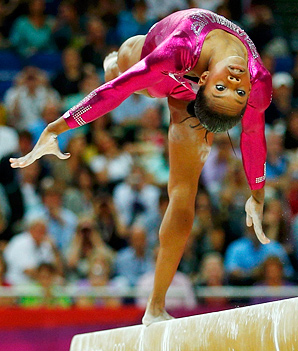Life-changing victory for Douglas
She woke up in London on Thursday morning to the beat of raindrops on the roof, and she knew it was going to be a great day. "My mom always told me that rain was God's manifestation of something really special about to happen," she said. She was right, because by the time Douglas, the pint-size, 16-year-old gymnast, closed her eyes and fell asleep Thursday night -- if she ever did -- she was the Olympic gold medalist in the all-around competition, which will only change the rest of her life.
Winning the gold not only earned Douglas a place in gymnastics history alongside other iconic all-around winners like Nadia Comaneci and Mary Lou Retton, but it also will almost certainly make her a very wealthy teenager in short order. Her only endorsement relationship at the moment is with Procter & Gamble. That will change soon.
[Photo Gallery: Classic pictures of Gabby Douglas]
It will change because Douglas, known as the Flying Squirrel because of her aerodynamics on the uneven bars, turned in a consistent, high-quality performance on Thursday, just good enough to edge silver medalist Viktoria Komova of Russia. Aliya Mustafina, also of Russia, took the bronze in a tiebreaker over American Aly Raisman, who finished with the identical point total to Mustafina's. The tiebreaking procedure, which is to take both gymnasts' three highest apparatus scores, went in Mustafina's favor.
"I'm obviously disappointed, but to be tied for the third-best gymnast in the world is a great honor," Raisman said. "And I'm so happy for Gabby."
Douglas, 4-foot-11 and 95 pounds, might seem tiny enough to fit in your backpack, but she's steely tough. "You've got to be confident when you're competing," she said. "You've got to be a beast." She led after each of the four rotations, never once looking nervous or unsure. "I believe that she earned her gold medal," Komova said. "She was very, very good tonight."
By the time Douglas reached her final event, the floor exercise, she had the crowd at North Greenwich Arena in the palm of her hand. Chants of "Go Gabby!" floated down from the stands, and the crowd clapped rhythmically throughout her routine. When she finished, Douglas looked like she knew she had won the gold even when Komova, whose floor routine was still to come, had a chance to overtake her. Needing a 15.60 to win, Komova could manage only a 15.1, making Douglas a golden girl.
Komova was devastated when the dramatic finish went against her. When she saw her score flash up on the scoreboard, she collapsed in tears and Mustafina consoled her as they walked off the floor.
But for Douglas, there was nothing but joy. She has a huge, warm smile and a willingness to play to the crowd -- all the charisma to make her a star, now that she has the accomplishments (she also has an Olympic gold from the team competition) to back it up. Is she ready for all that is about to come her way?
"You know, I say I am, but I know I'm probably not," she said.
[Brian Cazeneuve: Best U.S. women's team ever?]
She has talked with her parents and her agent, Sheryl Shade, about the opportunities she's about to receive, but she politely declined to discuss those conversations. Shade has represented Dominique Moceanu, Shannon Miller, Paul Hamm and Shawn Johnson, among others. She also negotiated deals with Wheaties and the Got Milk? campaign for the 1996 U.S. women's team that won gold. Don't be surprised if Douglas becomes a very familiar face in coming days.
Douglas not only joined Retton, Carly Patterson and Nastia Liukin as the only American women to capture the all-around gold, but she also became the first African-American woman to win the title.
"Oh, my gosh, I forgot about that," she said. "It's definitely an amazing feeling and great honor to be the first African-American to win. I hope I can inspire people. My mother told me that I can inspire a nation."
As a minority in a predominantly white sport, Douglas has experienced her share of awkwardness, like when she moved to Des Moine, Iowa, two years ago to train with Johnson's former coach, Liang Chow.
"Sometimes I'd play rap music and I'd say [to the other gymnasts], 'You don't know this song?' " she said. "Then they would play some country and I'd be clueless. It was like, awkward."
[Photo Gallery: U.S. women's team wins gold]
But the move from her home in Virginia Beach, Va., to Des Moines paid off, even though it took two years of persuading from Douglas and her older sister Arielle to get their mother, Natalie Hawkins, to agree to let her go.
"Letting go of Gabrielle was one of the hardest things I've ever had to do in my life, but it's now one of the most rewarding things I've ever gotten to experience," Hawkins said. "I've raised an Olympian. That's a powerful statement right there."
As she stood on the medal stand Thursday, Douglas thought about the sacrifices, the long hours of practice, the move away from her family.
"I thought about all of it, and how good it feels to know that it was all worth it," she said. "It all paid off."
The funny thing was, Douglas was talking as if she had reached the end of a journey when in truth, it is just beginning.





